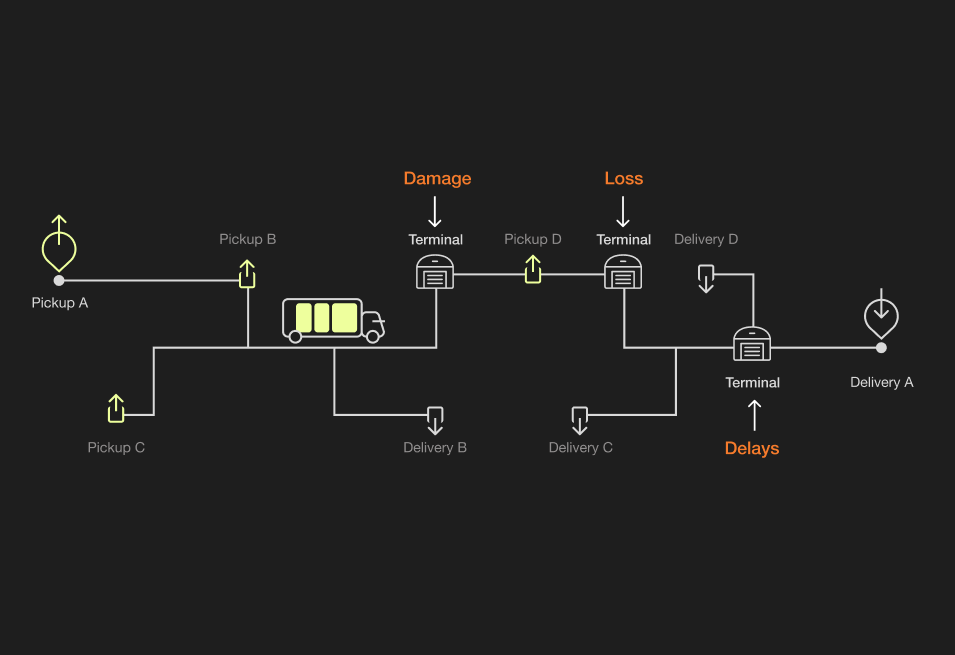What is a Shipper?

We live in the age of technology. Much of our lives seem to be driven by unseen forces trapped inside sophisticated computer programs we can neither see nor understand. We flip a switch and have instant light, push a button and watch television, pick up our phone and are magically connected to someone thousands of miles away. Apps with high-tech algorithms tell us how to work out, where to eat, or even who to date.
However, many of our most basic human needs revolve around the things we can see and touch—things like food, beverages, furniture, appliances, cars, and industrial goods. These basic needs aren't delivered from the manufacturer to the consumer as if by some dark magic. These essential elements in our lives require shipping.
Shippers fulfill an important part of the supply chain. Whether by trucking, or freight train, or air, shippers deliver both packages and cost-savings to their dedicated customers.
What is a shipper?
By definition, a “shipper,” sometimes referred to as the “consignor,” is a person, business, or entity that tenders or “cosigns” the product to the carrier. As the preferred shipper, you are the person or business that most often supplies or owns the product.
The shipper is not to be confused with a freight carrier, which is a business or a person responsible for transporting the shipper's product. The freight carrier is also responsible for any damage to that product during transport.
Why is shipping important?
Shipping can be considered the “spinach” of every business’ wellbeing. Although almost anyone would choose a hot fudge sundae over spinach and other vegetables, you realize those veggies are necessary for staying healthy.
It's no different for you as a business owner. While no business owner relishes the idea of tackling the intricacies of lead times or shipping (the “spinach” of running a business), this is one of the most vital components of owning a business. Understanding and following through on good shipping practices will go a long way to protecting the “health” of your business.
So what, exactly, is involved in being a successful shipper?
What kind of shipper are you?
Start by understanding your shipping needs and business practices. You know you need to get your product to market, but there are many different shipping options. For many shippers, the options are dizzying and overwhelming. There are many different elements to consider before you send your product to market. You will want to consider:
- Your particular type of shipment.
- How fast do you need your product need to be delivered?
- The size of your shipment.
- How fragile is your shipment?
- How hazardous is your shipment?
- What is your budget?
- How big is your shipment?
- What are your consumer’s expectations for delivery?
- What are market conditions?
When you understand your needs, you can be the shipper of choice for your ideal customers.
What is my role as a shipper?
Once you have determined what type of shipper you are, you must next understand your role as a shipper. Most importantly, you must remember that your number-one responsibility is to your customer. Whatever your cargo or product is, you want your goods and materials to arrive on time and in good condition.
To accomplish this, you are going to need a well-organized team. Remember, as a shipper, you are responsible for that first transfer of your product, and this involves many tasks. That includes inventory, creating a transportation management system, proper storage, packing, selecting the product, and different systems of record-keeping and accounting.
If you are a one-person operation, you must be ready to take on many hats to properly ship your product. If you are a more significant business, you will need a team of people who make up your shipping department. What roles would these people in the shipping department fill? The positions are varied, including managers, clerks, material handlers, and administrative personnel, for starters.
Guaranteeing the delivery of a quality product might involve the use of specialized equipment when tracking as you prepare your cargo for shipping. This preparation can include hand trucks, conveyor belts, forklifts, computer systems, and even code scanners.
Additionally, your cargo must be adequately and securely packed. Good packing involves using the correct materials to safeguard your product. Also, keep in mind your shipment must include a shipping label and packing slip for each item. From there you must document and maintain shipping records. Proper documentation often requires investing in a comprehensive computerized system.
Once the cargo is ready to be shipped, scheduling shipments with the right freight carrier is essential. Consider the volume, weight, cost, and fragility of your products when choosing a carrier. You and your support staff should monitor all financial transactions that go into any receiving, storage, and any other shipping services you may incur.
Finally, please take into consideration your staff as they handle and pack your product. Unfortunately, many packing materials may be hazardous. It is your responsibility as the shipper to be familiar with the codes and safety measures involved in providing a safe environment to your employees and the safety of the final customer. Check with the Department of Transportation rules for transporting hazardous materials.
Should I choose international or domestic shipping?
Shipping domestically and internationally have similarities, but at the same time, there is a vast difference between the two. The wise shipper will weigh these differences when considering where to ship their cargo or product.
For the shipper that is interested in becoming a part of the global market, the differences between domestic and international shipping can make a world of difference to the stability and ultimate success of your business. Do not be caught unaware and pay the price for your lack of knowledge.
International shipping
When shipping internationally, the shipper has to take into consideration these factors:
- A higher cost of shipping.
- Potential fines and penalties. If the shipper does comply with requisite regulations, he/she can incur great expenses because of fines and penalties. These costs can put a big dent in your bottom line and offset the perks of doing business in a global market.
- Longer transit times.
- International trade regulations for both the country of origin and the destination country.
- Language and customs. Both of these can create potential miscommunication and delays.
- Increased paperwork. Especially if there is a cultural or language barrier, the shipper may find they become embroiled in complicated paperwork that bogs down delivery. If this occurs, it is often best to involve a mediator.
- Remember that the shipper must consider adjusting his final price of their product to account for varying fees, taxes, and charges.
- Your method of shipping must be appropriately documented and comply with all regulations. While it might seem overwhelming, it is well worth the preparation to avoid fines and unnecessary delays.
- The shipper must keep in mind how the exchange rate of a foreign country affects their bottom line profit.
- As time goes on, international shipping regulations become more and more complex, and the shipper must continuously keep abreast of these regulations.
Domestic shipping
Shipping domestically is much less complicated than international shipping. The following characterizes domestic shipping:
- Most commonly, the method of transportation is done with trucking or trains. Many trucking companies offer real-time tracking through an electronic logging device (ELD) to give you very accurate information.
- Minimal fees. Truckers are typically more affordable than shipping internationally.
- While shipping domestically is a far more straightforward process, it also limits the potential market of your product and perhaps your increased profit.
LTL or FTL shipping?
Whether you are a small or large business, there are two types of basic shipping designations. They are as follows:
LTL
LTL is the shorthand used for “less-than truckload” shipping. As an LTL shipper you should be aware of the following:
- “Less-than truckload” does not take up the entire truck that will be hauling your shipment.
- To be considered for an LTL shipment, your product should weigh between 100 and 10,000 pounds.
- The remaining portion of the truck will be made up of other shipper’s products.
- The LTL method of shipping is more budget-friendly than FTL shipping.
- If time is not a significant component for your shipment, or your product is small in size and not fragile, LTL freight shipping is a good option.
- Because LTL freight carries other products besides your own, your shipment will take longer to deliver than FTL shipping.
FTL
FTL means “full truckload.” As an FTL shipper you should be aware of the following:
- Your product, by definition, will take up an entire truck by itself.
- Occasionally, even if your shipment doesn’t take up the entire truck, you still may want to consider FTL shipping. For instance, if your product is high-risk, or if your shipment is fragile.
- Since FTL is only a single destination designated by the shipper, it's a more time-efficient method of transport compared to LTL.
Maximizing your role as a shipper
Know what kind of shipper you are and your role and responsibilities as a shipper. Whether you choose to take the increased risk and potentially higher reward of shipping internationally, or decide on the more straightforward approach of domestic shipping, it is essential you understand your role as a shipper in the freight market. If you do your homework and appreciate all the aspects of getting your product to market, you will reap the reward of a thriving and growing business.





